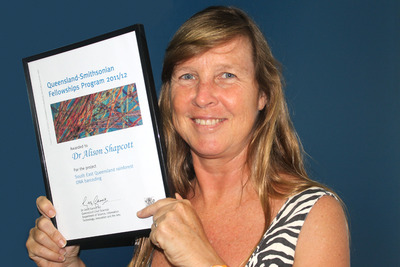DNA barcodes distinguish rainforest plants
The creation of DNA barcodes for the 870 species of south-east Queensland’s rainforest trees, shrubs, vines and herbs will help discriminate between closely related species of plants.
Plant scientist Dr Alison Shapcott from the University of the Sunshine Coast is conducting the work, which will build a global reference database.

“We’ve generated a unique, three-gene DNA barcode for most species,” said Shapcott, adding that so far she has extracted and sequenced the DNA of 775 species in south-east Queensland. The work is being done in collaboration with the Queensland Herbarium and the US Smithsonian Institution.
Queensland’s Minister for Science, Information Technology, Innovation and the Arts, Ian Walker, praised Shapcott’s research saying that it could cut the time it takes to identify unknown plants and plant by-products.
“DNA barcodes will help quarantine officers, forensic investigators, land owners and others who need to quickly and accurately identify unknown plants and plant parts that may be poisonous, prohibited or legally protected,” he said.
Shapcott, a Senior Lecturer in Vegetation and Plant Ecology and member of USC’s GeneCology Research Centre, was awarded a Queensland-Government-Smithsonian Fellowship in 2012 to spend half the year in the institution’s laboratories in Washington DC.
“I was able to achieve a lot in a short time by working alongside the Smithsonian researchers who perfected the extraction and sequencing of plant DNA barcodes and Queensland Herbarium botanists who are experts on the state’s flora,” she said.
Shapcott said tests had shown the Conondale Ranges and the Scenic Rim subregions had the highest species diversity while the Stanthorpe and Tenterfield plateaus were considerably less diverse but still quite distinct.
She will return to the Smithsonian next month to follow up the project.
“I think the government’s support is fantastic both for this research and for USC,” she said. “Next year I expect to have an honours student working on this project on campus at Sippy Downs to help finalise it.”
September is National Biodiversity Month.
Novel antibiotic activates 'suicide' mechanism in superbug
Researchers have discovered a new class of antibiotic that selectively targets Neisseria...
Modifications in the placenta linked to psychiatric disorders
Schizophrenia, bipolar disorder and major depression disorder are the neuropsychiatric disorders...
ADHD may be linked with an increased risk of dementia
An adult brain affected by attention deficit hyperactivity disorder (ADHD) presents modifications...




